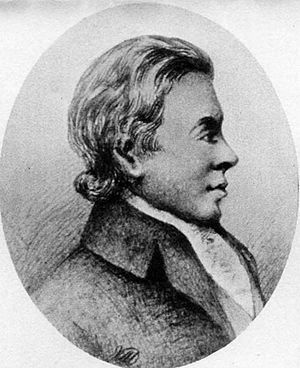Edward Charles Howard facts for kids
Quick facts for kids
Edward Charles Howard
|
|
|---|---|

Edward Charles Howard
|
|
| Born | 28 May 1774 |
| Died | 28 September 1816 (aged 42) |
| Nationality | British |
| Occupation | Chemist |
| Known for | "The first chemical engineer of any eminence" |
|
Notable work
|
Analysis of the composition of iron meteorites |
| Awards | Copley medal for his work on mercury (1800) Howardite |
Edward Charles Howard (born May 28, 1774 – died September 28, 1816) was a clever British chemist. Many people call him the "first chemical engineer of any importance." He made big discoveries that changed how we make sugar and understand space rocks.
Contents
Amazing Discoveries and Inventions
Edward Charles Howard was a very active scientist. He joined the Royal Society in 1799. This is a famous group for scientists. In 1800, they gave him the Copley Medal. This award was for his important work with the element mercury.
Mercury and Explosives
Howard discovered something called mercury fulminate. This is a very powerful primary explosive. It means it can start a bigger explosion. This discovery was important for many uses.
Revolutionizing Sugar Making
In 1813, Howard invented a new way to refine sugar. Before him, sugar cane juice was boiled in open pots. This often burned the sugar and wasted fuel.
Howard's new method used a special closed pot. This pot was heated by steam and had a partial vacuum inside. A vacuum means there is less air pressure. At lower pressure, water boils at a lower temperature.
This invention saved a lot of fuel. It also stopped the sugar from turning into caramel. His invention is called Howard's vacuum pan. It is still used today to make sugar.
Unlocking Meteorite Secrets
Edward Howard was also very curious about meteorites. These are rocks that fall from space. He was especially interested in "natural iron" meteorites.
He found that many space rocks had a mix of nickel and iron. This special mix was not found in rocks on Earth. This discovery helped scientists understand that these rocks really came from space. One type of meteorite is even named after him: Howardite.
See also
- Glossary of meteoritics
 | Janet Taylor Pickett |
 | Synthia Saint James |
 | Howardena Pindell |
 | Faith Ringgold |

